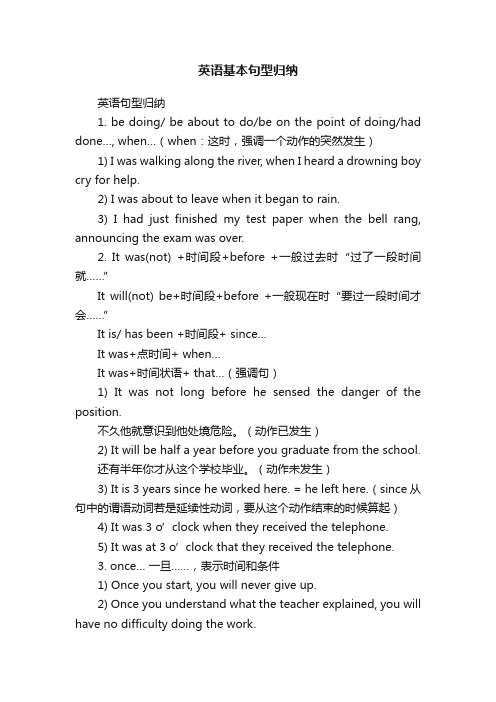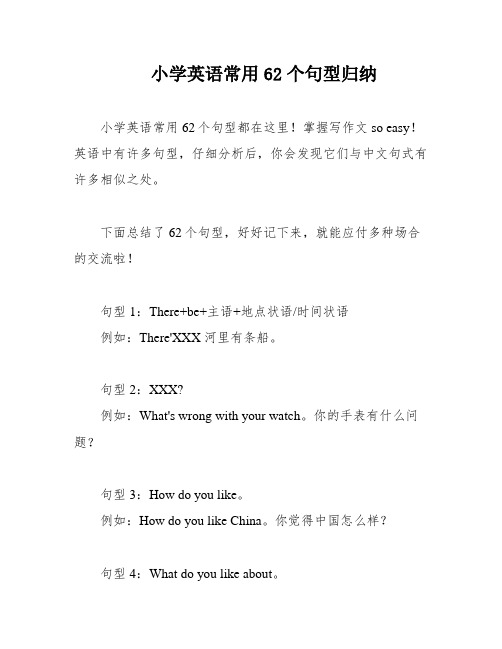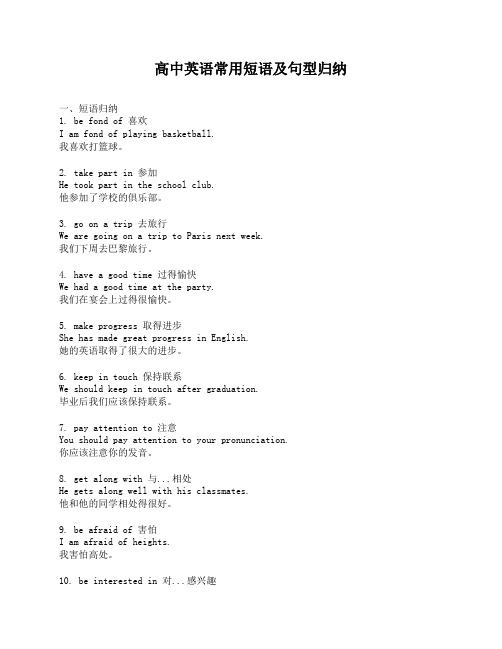句型归纳
大学英语重点句型归纳

大学英语重点句型归纳大学英语重点句型归纳导语:把重点句型归纳在一起,方便运用,又方便记忆,下面是YJBYS店铺帮大家整理的大学英语重点句型归纳,欢迎参考!1. may (just) as well do sth.may as well do sth. 表示“不妨;倒不如”,用来提出建议。
如:We may as well have a try and see if it can be done.我们不妨试一试,看看能否办成。
There is nothing to do, so I may as well go to bed.没什么事可做,我还是上床睡觉好了。
[注意]might as well也可表示“不妨”,但语气更委婉一些。
其也是may as well的过去时形式。
如:Since she had come up to London, she might as well speak her mind.既然她已来到了伦敦,她还不如说出真心话。
2. As far as I know ...as far as 表示“就……而言;从……来看”。
as far as I know就我知道的`而言;as far as I can see就我能看到的而言;as far as they are concerned 就他们而论;as far as the eye can reach 就视力所及。
如:As far as I know, he isn't coming to the party.就我所知,他不会来参加这次聚会。
高中英语重点句型归纳As far as I am concerned, I cannot object to your marriage.就我个人而言,我不反对你们的婚事。
知识拓展as far as还可表示“到某一指定地点;一直到(某地)”。
如:They walked as far as the foot of a mountain.他们一直走到山脚下。
初中语文固定句型总结归纳

初中语文固定句型总结归纳初中语文学科中,掌握一定数量的固定句型对于学生的写作能力和语言表达能力的提升有着重要的作用。
固定句型可以帮助学生构建准确、流畅、富有表达力的句子,使文章更加连贯且有逻辑性。
本文将总结归纳初中语文中常用的固定句型,以便学生在写作过程中能够更好地应用。
一、解释说明句型1. A is (not) a kind of B.A是一种(不是一种)B。
2. A is used/seen/found/designed for doing/to do something.A被用于/被看作/被发现/被设计用于做某事。
3. A is used to do something.A被用于做某事。
4. A is different/similar to/from B in some/many ways/aspects.A在某些/许多方面与B不同/相似。
5. A is a good/bad example of B.A是B的一个好/坏例子。
6. A is made of/from B.A由B制成/由B做的。
二、比较对比句型1. A is more/less + 形容词 + than B. A比B更/不如+形容词。
2. A is + 形容词 + er than B.A比B更+形容词。
3. A is as + 形容词 + as B.A和B一样+形容词。
4. A is the + 形容词 + est + 名词. A是最+形容词+的名词。
5. A is not as + 形容词 + as B.A不如B+形容词。
6. Both A and B are + 形容词.A和B都是+形容词。
三、因果推理句型1. A leads to/causes/results in B.A导致/引起/造成B。
2. A is because of/due to B.A是因为B。
3. A is the result/effect/consequence of B.A是B的结果/影响/后果。
六年级句型知识点归纳

六年级句型知识点归纳一、陈述句句型1. 主语+谓语动词例如:我喜欢读书。
2. 主语+be动词+表语例如:她是个好学生。
3. 主语+动词+宾语例如:我看见了一只小猫。
4. 主语+动词+间接宾语+直接宾语例如:妈妈给我买了一本故事书。
5. 主语+动词+宾语+宾语补足语例如:他们选我当班长。
6. 主语+情态动词+动词原形例如:你可以去玩。
7. 主语+助动词+动词过去分词例如:我被老师批评了。
8. 主语+be动词+现在分词例如:她正在看电视。
二、疑问句句型1. Yes/No疑问句:把句子的陈述形式改为疑问句,肯定回答用"Yes",否定回答用"No"。
例如:你是学生吗?2. 选择疑问句:在句子中提出两个或多个选择,让对方选择其中一个。
例如:你想要苹果还是香蕉?3. 特殊疑问句:对句子中的某个成分进行提问,使用特殊疑问词。
例如:你从哪里来?4. 一般疑问句:对句子的陈述形式进行提问而不改变句子中的词语顺序,通常用于询问事实。
例如:你喜欢篮球吗?三、祈使句句型1. 动词原形开头的祈使句例如:保持安静。
2. don't + 动词原形的祈使句例如:不要迟到。
四、感叹句句型1. What + 名词 + 主语 + 谓语例如:天气多好啊!2. How + 形容词/副词 + 主语 + 谓语例如:多么聪明的孩子啊!五、否定句句型1. 主谓倒装句型例如:I can't swim. → Can't I swim?2. 否定副词放在句首句型例如:He never plays football.3. 否定词+be动词+表语例如:这不是我的书。
六、比较句句型1. as + 形容词/副词原级 + as例如:Tom is as tall as Jack.2. 主语+be动词+形容词比较级+than+宾语例如:This book is more interesting than that one.七、复合句句型1. 宾语从句例如:我知道你想要什么。
英语基本句型归纳

英语基本句型归纳英语句型归纳1. be doing/ be about to do/be on the point of doing/had done…, when…(when:这时,强调一个动作的突然发生)1) I was walking along the river, when I heard a drowning boy cry for help.2) I was about to leave when it began to rain.3) I had just finished my test paper when the bell rang, announcing the exam was over.2. It was(not) +时间段+before +一般过去时“过了一段时间就……”It will(not) be+时间段+before +一般现在时“要过一段时间才会……”It is/ has been +时间段+ since…It was+点时间+ when…It was+时间状语+ that…(强调句)1) It was not long before he sensed the danger of the position.不久他就意识到他处境危险。
(动作已发生)2) It will be half a year before you graduate from the school.还有半年你才从这个学校毕业。
(动作未发生)3) It is 3 years since he worked here. = he left here.(since从句中的谓语动词若是延续性动词,要从这个动作结束的时候算起)4) It was 3 o’clock when they received the telephone.5) It was at 3 o’clock that they received the telephone.3. once… 一旦……,表示时间和条件1) Once you start, you will never give up.2) Once you understand what the teacher explained, you will have no difficulty doing the work.4. the +比较级……,the +比较级……“越……越……”The more books you read, the more knowledge you will get.5. whether…or…无论是……还是……1) Whether the weather is good or bad, they will set off as they planned.2) Any person, whether young or old, has his own worth.6. 祈使句+or/otherwise +结果句或祈使句+ and +结果句1) Stop doing such a foolish thing, or you will be punished in time.2) More effort, and the problem would have been settled.7. every time/each time/next time/the first time/any time等短语引导时间状语从句,表示“每当,每次,下次,第一次,任何时候”。
句型归纳总结

句型归纳总结句型是语言表达中的基本单位,不同的句型结构可以传达不同的意义。
在语言学习的过程中,归纳总结各种句型是非常重要的,可以帮助我们更好地理解和运用语言。
本文将对一些常见的句型进行归纳总结。
1. 主谓结构主谓结构是最基本的句型,用来表达主语和谓语的关系。
主语通常是句子的主要动作执行者或所描述的事物,而谓语则表示主语的状态或动作。
例句:- 他跑步。
(He runs.)- 她是一名医生。
(She is a doctor.)2. 主谓宾结构主谓宾结构是一种常见的句型,用于表达主语执行的动作或持有的状态,并指定该动作或状态的对象。
例句:- 我喜欢音乐。
(I like music.)- 她读了一本有趣的书。
(She read an interesting book.)3. 主谓表结构主谓表结构用来表达主语持有的某种特征、状态或身份。
例句:- 她是个聪明的学生。
(She is an intelligent student.)- 这座城市很美丽。
(This city is beautiful.)4. 主系表结构主系表结构用于表示主语与表语之间的关系,表达主语的特征、状态或身份。
例句:- 他们很困。
(They are tired.)- 这个问题看起来很复杂。
(This problem looks complex.)5. 主系宾结构主系宾结构表示主语与宾语之间的关系,并通过系动词指示主语的状态。
例句:- 我使他生气了。
(I made him angry.)- 学习让我快乐。
(Studying makes me happy.)6. 并列句并列句是由两个或多个简单句连接而成的句子,通过连接词(例如:而且、但是、所以等)来表达句子之间的关系。
例句:- 我喜欢吃水果,而且我每天都吃。
(I like eating fruits, and I eat them every day.)- 她工作很努力,所以她得到了晋升。
(She works hard, so she got promoted.)7. 从句从句是一个句子中的一部分,不能单独成立,依赖于主句来表达完整的意义。
小学英语常用62个句型归纳

小学英语常用62个句型归纳小学英语常用62个句型都在这里!掌握写作文so easy!英语中有许多句型,仔细分析后,你会发现它们与中文句式有许多相似之处。
下面总结了62个句型,好好记下来,就能应付多种场合的交流啦!句型1:There+be+主语+地点状语/时间状语例如:There'XXX 河里有条船。
句型2:XXX?例如:What's wrong with your watch。
你的手表有什么问题?句型3:How do you like。
例如:How do you like China。
你觉得中国怎么样?句型4:What do you like about。
例如:What do you like about China。
你喜欢中国的什么?句型5:had better(not)+动词原形例如:You'd better ask that policeman over there。
你最好去问问那边的警察。
句型6:How+adj。
/ adv。
+主语+谓语!What a/ an+adj。
+n。
+主语+谓语!例如:How cold it is today。
今天多冷啊!What a fine picture it is。
多美的一幅画啊!句型7:Thank+sb。
+for(doing)sth.例如:Thank you for coming to see me。
感谢你来看我。
句型8:So+be/情态动词/助动词+主语例如:He is a student。
So am I。
他是学生,我也是。
句型9.not。
until。
例如:XXX。
直到他的父母回来他才吃饭。
句型10:比较级+and+比较级例如:XXX XXX。
那孩子哭得越来越厉害。
句型11:the +比较级,the +比较级例如:The more one has,the more one wants。
越有越贪。
Art and music are two different forms of n.艺术和音乐是两种不同的表达形式。
高中英语常用短语及句型归纳

高中英语常用短语及句型归纳一、短语归纳1. be fond of 喜欢I am fond of playing basketball.我喜欢打篮球。
2. take part in 参加He took part in the school club.他参加了学校的俱乐部。
3. go on a trip 去旅行We are going on a trip to Paris next week.我们下周去巴黎旅行。
4. have a good time 过得愉快We had a good time at the party.我们在宴会上过得很愉快。
5. make progress 取得进步She has made great progress in English.她的英语取得了很大的进步。
6. keep in touch 保持联系We should keep in touch after graduation.毕业后我们应该保持联系。
7. pay attention to 注意You should pay attention to your pronunciation.你应该注意你的发音。
8. get along with 与...相处He gets along well with his classmates.他和他的同学相处得很好。
9. be afraid of 害怕I am afraid of heights.我害怕高处。
10. be interested in 对...感兴趣She is interested in learning Chinese.她对学习中文感兴趣。
11. take care of 照顾She takes care of her younger brother.她照顾她的弟弟。
12. be tired of 对...厌倦I am tired of doing the same thing every day.我厌倦每天做同样的事情。
英语句型汇总

英语句型汇总
1. 主谓结构:主语+动词,例如:“She sings.”
2. 主谓宾结构:主语+动词+宾语,例如:“They eat apples.”
3. 主谓宾宾结构:主语+动词+宾语+宾补,例如:“I consider him a friend.”
4. 主系表结构:主语+系动词+表语,例如:“She is happy.”
5. There be 句型:There + be动词 + 宾语,例如:“There is
a cat on the table.”
6. 疑问句:以助动词、系动词或实义动词开头构成疑问句,例如:“Are you coming?”
7. 否定句:在句子中加入否定词构成否定句,例如:“He does not like coffee.”
8. 条件句:If条件句,例如:“If it rains, we will stay at home.”
9. 倒装句:完全倒装、部分倒装等,例如:“Rarely have I seen such a beautiful sunset.”
10. 比较句:用于比较两者之间的关系,例如:“She is taller than her sister.”。
- 1、下载文档前请自行甄别文档内容的完整性,平台不提供额外的编辑、内容补充、找答案等附加服务。
- 2、"仅部分预览"的文档,不可在线预览部分如存在完整性等问题,可反馈申请退款(可完整预览的文档不适用该条件!)。
- 3、如文档侵犯您的权益,请联系客服反馈,我们会尽快为您处理(人工客服工作时间:9:00-18:30)。
句型1would rather that somebody did…"宁愿……;更愿意……"(表示现在或将来的愿望)would rather that somebody had done…"宁愿……;更愿意……"(表示过去的愿望)[例句]I'd rather you posted the letter right now. 我想让你现在去寄信。
I'd rather you were not a celebrated actor. In that case, we could spend more time together.我倒情愿你不是个知名演员,这样我们可以有更多的时间在一起。
I'd rather that I hadn't seen her yesterday. 我情愿昨天没有看到她。
句型2as if/though+主语+did/had done…好像……(表示现在或将来的情况用过去时;表示过去的情况用过去完成时)[参考句型4][例句]Our head teacher treats us as if we were her own children, so all the students in our class think highly of her.Alan talked about Rome as if he had been there. Alan谈起罗马来就好像他去过那里似的。
句型3"wish +宾语从句",表示不大可能实现的愿望表示现在的愿望:主语+过去时;表示过去的愿望:主语+had done;表示将来的愿望:主语+would/could do[例句]How I wish we students had more free time to relax ourselves! 我们学生多么希望有更多的自由时间放松自己!I failed in the maths exam. How I wish I hadn't wasted so much time playing! What a pity you can't go to the party. How I wish I could dance with you at the party!句型4It's high/about time that somebody did (should do) (should通常不省略) …早就该……[例句]It's time that you went to school.= It's time that you should go to school.It's high time that we did something to improve our environment. 该是我们为环保做些事情的时候了。
I think it's high time that she made up her mind. 我想她该拿定主意了。
句型5情态动词+动词不定式完成结构的用法could have done "本来可以……"(表示过去没有实现的可能)。
might have done "本来可能……;本来应该或可以做某事"(实际没有发生;含有轻微的责备语气。
)should/ought to have done "本来该做某事"(而实际未做)should not/ought not to have done "本来不该做"(实际却做过了,含有责备语气) needn't have done "本来不必做"(但是已经做过了)would rather have done "当时宁愿做了某事"(实际没有做过);否定式would rather not have done表达相反意思,两者都有表示"后悔"之意。
句型6as, though, although引导的让步状语从句。
[注意]although位于句首;though位于句首或句中;as位于句中=though。
它的词序是把句中强调的形容词、副词、动词或名词放在连词前。
[参考倒装结构] 请注意下列句式的变化:[例句]1. Although/Though I'm young, I already know what career I want to follow. →Young as/though I am, I already know what career I want to follow.我虽然年轻,但我已经明白我应该追随什么样的事业。
2. Although/Though I respect him very much, I cannot agree with his idea.→Much as/though I respect him, I cannot agree with his idea. 虽然我很尊重他,但是我不同意他的观点。
3. Although/Though he is a child, he knows a lot of Chinese characters.→Child(省略冠词)as/though he is, he knows a lot of Chinese characters. 他虽然还是个孩子,却认识了许多汉字。
4. Although he tried, he couldn't solve the problem.→Try as he might, he couldn't solve the problem. 尽管他努力了,但是他没有解决问题。
5. Although it is raining, I'm going out for a walk.→Raining as it is, I'm going out for a walk. 天虽然在下雨,我还是要出去散步。
6. Strange as it may seem, nobody was injured in the accident. 这次意外虽然显得不可思议,却没有人受伤。
7. Much as I would like to help, I have a lot to do. 虽然我很想帮助你,但是我有很多事要做。
8. Object as you may, I will go. 纵使你反对,我也要去。
句型7…before…特殊用法(1)"没来得及……就……"[例句]The roof fell before he had time to dash into the room to save his baby.他还没有来得及冲进房间救孩子,房顶就塌了。
He ran off before I could stop him. 我还没有来得及阻止,他已经跑了。
To my great disappointment, my favorite singer left the concert before I could have a word with her.让我非常失望的是,我还没有来得及和我最喜欢的歌手打招呼,她就已经离开了。
句型8…before…特殊用法(2)"过了多久才……"或"动作进行到什么程度才……"[例句]They walked about fifty miles to the west before they saw a village.他们西行50英里才看到一个村庄。
The workers worked day and night about three days before everything returned to normal.工人们连续工作3天才使一切恢复正常。
He almost knocked me down before he knew it.他几乎撞到我了才意识到。
We had walked a long way before we found some water.我们走了很长的路才找到一点水。
Five years went by before I knew it. 不知不觉,五年过去了。
句型9It was + 时间段+before…."过了多久才(怎么样)……"It was not long before…."不久,就……"It will (not) be +时间段+before…"要过多久(不久)……才……"(before从句谓语动词要用一般时态)[例句]It was not long before he sensed the danger of the position.不久他就意识到他处境的危险。
It was five days before he came back. 五天后他才回来。
It will be half a year before you graduate from the school. 再过半年你才能毕业。
It will not be long before they understand each other. 他们大概不久就会互相了解。
句型10in case of…(+n.) "以防;万一";in c ase that…"以防,万一……"(谓语动词用一般现在时态或should+动词原形)[例句]In case of fire, what should we do?Please remind me about it in case I forget/should forget. 万一我忘了,请提醒我。
In case (that) John comes/should come, please tell him to wait.Please take your umbrella in case (that it rains/should rain).带上雨伞,以防下雨。
句型11It强调句型强调句的基本构成:It is/was + 被强调的部分+ who(主要指人时)/that + 其余部分[注意1]这种结构可以强调句子的主语、宾语、状语(包括时间,地点,方式,原因等),但是不能强调谓语动词(参考句型15)。
